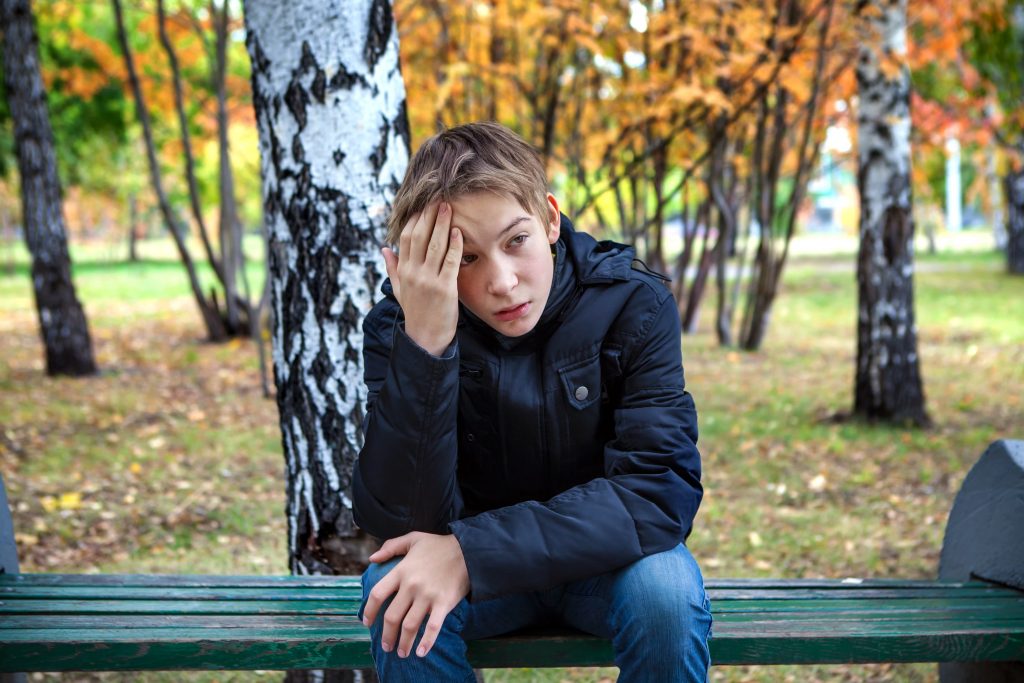 Upset stomach, butterflies, and being on edge. Anxiety can show up in teens in a lot of different ways. This article will help you understand how anxiety might manifest itself in teens and what you can do to help your teenager.
Upset stomach, butterflies, and being on edge. Anxiety can show up in teens in a lot of different ways. This article will help you understand how anxiety might manifest itself in teens and what you can do to help your teenager.
What Exactly is Anxiety?
Anxiety is a feeling that everyone experiences. It’s the feeling of being on edge and nervous before doing something you find intimidating or nerve-wracking. But anxiety can also be a mental illness in that some individuals experience anxiety throughout their entire day and lives.3 Ways Anxiety Can Express Itself in Your Teen
There are many ways that anxiety can manifest itself in your teen. Here are just a few things to look out for.#1: They Seem To Struggle With Negative Thinking
A teen with anxiety may be struggling with negative thinking. These negative thoughts may start to show up in conversations with your teenager. These negative thoughts can be about themselves, other people, situations, and even life itself. Over time, you might start to see that the same themes or patterns appear in how the negative thoughts they’re having. That’s because negative thoughts often have a pattern. Here are some types of negative thoughts.- All or Nothing: With this negative thought pattern, either everything is going well or it’s all horrible.
- Personalization: This is when your teen takes everything another person says or when anything happens as a sign about who they are. An example might be your teen thinking that everyone hates them because some of their friends didn’t text them “on time.”
#2: They’re Most Often Angry and Stressed Out
As you might assume, a teen struggling with negative thinking patterns will most likely be stressed out and angry. That’s because being in a constant state of worry and fear leads to feeling overwhelmed, stressed out, and angry. Besides looking out for outbursts of anger, you can also see if they mention always feeling tired and if they’re isolating. These are both signs of the body responding to anxiety by trying to preserve energy and protect itself from anything that might feel like a threat.#3: They Might Engage in Avoidance and/or Defiance
Because teens are still developing, they don’t fully know how to communicate their feelings. This is especially true since teens are trying to find their identity and would like to figure things out for themselves. With teens that are struggling with anxiety, they might avoid conversations or situations that trigger their anxiety. They may also be defiant since they’re in a constant state of being overwhelmed and stressed out, while not being able to communicate this to others. Defiance shows up differently in every teen.How You Can Help Your Teen
There are many ways that you can help your teen. Here are some strategies:- Conversations About Stress:
- In “The Upside of Stress” by Dr. Kelly McGonigal, she talks about how it’s not stressed that decreases lifespans and longevity, but the mindset surrounding stress. A teen struggling with anxiety might see stress as inherently bad, whereas stress can also be healthy in that it gives individuals motivation and desire to do things. You might go back to the example of how in fitness, individuals literally need to stress their bodies in order for their bodies to become stronger.
- Practice Mindfulness with Your Teen:
- Mindfulness is being aware of your present without having any judgment about it. For example, one way that you can practice mindfulness with your teen might when you start noticing that your teen looks more stressed out, have them talk to you, and describe their emotions and how their body feels. This is important because you’re broadening your teen’s ability to talk about emotions and you’re also reminding them that when their thoughts are overwhelming, they can go back to their body and remind themselves of the present moment.
- Exposure to Causes of Anxiety:
- In “The Mindfulway Through Anxiety,” by Susan M. Orsillo and Lizabeth Roemer, they talk about how important it is for those who experience anxiety to be slowly exposed to the things or situations that are anxiety inducing. Just like with a muscle, your teen will need to build tolerance to feelings like anxiety, stress, and fear of uncertainty. But while you try to help your teen, please keep in mind that exposure therapy is best done by a professional mental health practitioner.


Leave a Reply